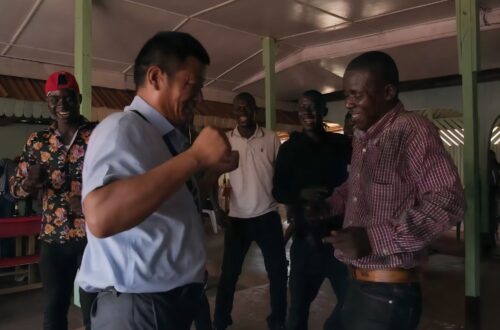‘Stonewalling’ shows independent Chinese filmmaking is still kicking
“Stonewalling,” a movie about sexuality and reproduction, was filmed within China, but funded solely from outside sources. It has sidestepped domestic censors and secured international premieres. Could this be a way forward for China’s independent filmmakers?

Stonewalling, which just had its U.S. premiere at the New York Film Festival, is the third full-length feature directed by Huáng Jì 黄骥 and Ryuji Otsuka. The duo continues to reflect on young women’s sexuality and reproduction in contemporary China, which were also the focus of their two previous films, Egg & Stone (2012) and Foolish Bird (2017).
Huang and Otsuka began their film career in the 2000s, when an independent documentary movement swept across China thanks to the rising availability of DV cameras. Born and raised in Hunan, Huang graduated from the scriptwriting department of Beijing Film Academy in 2007. Tokyo-born Otsuka made documentaries for Japanese television before moving to China in 2005, where he joined a booming independent documentary scene. Huang Ji and Ryuji Otsuka became partners privately and professionally, their films being the cinematic offspring of their relationship.
China news, weekly.
Sign up for The China Project’s weekly newsletter, our free roundup of the most important China stories.
In Stonewalling, they tackle surrogacy and egg donation, which in recent years experienced a boom on the Chinese black market and became one of the most heatedly debated issues. In Changsha, capital of Hunan province, 20-something Lynn is studying English and attending vocational training to become a stewardess while taking up odd modeling jobs. Her boyfriend works as an influencer and plans to immigrate to the UK, though Lynn lacks self-confidence and does not have such specific ambitions for the future. Meanwhile, back in Lynn’s hometown, her mother runs a small private gynecological clinic and goes into financial trouble following a medical malpractice that leads to a young patient’s miscarriage. To help pay off the compensation as fast as possible, Lynn considers making money selling her eggs on the black market, but after a physical check-up she discovers she’s pregnant. It’s here that she finds a way to kill two birds with one stone.
The legacy of independent documentary filmmaking is visible in the mode of production. The majority of the film was shot in a small town in Hunan, in the clinic of Huang Ji’s parents, who are cast as Lynn’s parents. The filmmaker’s familiarity with the environment and film crew — consisting of only three people — allowed for a large amount of creative freedom. Stonewalling was completed in 10 months, which roughly corresponds with the duration of a pregnancy.
The idea of experiencing duration, the actual time it takes to finish a task, is a creative concept that Huang and Otsuka implement in their films. The narrative is anchored in time, space, and a woman’s body, which makes it an example of corporeality in cinema. In a recent interview, Huang told me that the script was adjusted to the bodily experiences of the main actress, Yáo Hóngguì 姚红贵, her physical reality during filming. The actress starred in Huang and Otsuka’s two previous films, a collaboration that began 10 years ago. Therefore, all three films are also a document of Yao’s growing up, the way she and her body has changed. It makes the trilogy a project similar to Richard Linklater’s Boyhood, but stretched over three films and three different characters.
Stonewalling is a compelling, complex, multifaceted, and truly empathic portrait of daily life in contemporary China.
The initial inspiration behind Stonewalling is simultaneously scientific and deeply personal. It came from the filmmakers’ daughter, who one day asked Huang, “Why did you give birth to me?” It turned into a research question that guided the scriptwriting process, in which Huang built a bridge between her personal reflections on womanhood and the experiences of Chinese college students, who the filmmakers interviewed during their research. The accounts of the young generation’s entanglement in the social media-fueled gig economy makes Stonewalling a compelling, complex, multifaceted, and truly empathic portrait of daily life in contemporary China. The main character is not projected as a victim of the system, but an active agent in a society in which issues of class, gender, and ethnicity intersect.
Following the passing of the 2018 Film Promotion Law that regulated domestic and international exhibition of Chinese films, China’s last major grassroots independent film festival — the China Independent Film Festival — announced its closure in 2020. The discussion on the future of Chinese independent cinema became a topic of many pandemic-era Zoom events. Like Wáng Xiǎoshuài’s 王小帅 The Hotel, Stonewalling did not go through the censorship process that would enable officially-approved domestic and international releases. But whereas Wang’s film was completed abroad, Stonewalling was all shot in China. The production of the film is done indie-style, but the funding comes from film festivals (International Film Festival Rotterdam’s Hubert Bals Fund, Hong Kong IFF’s Hong Kong Asia Financing Forum). There was no Chinese-language coverage of the film upon its premiere in Venice and screenings at the New York Film Festival. However, considering the standstill that the entire Chinese film industry finds itself in (there were no China-wide theatrical releases between October 3 and October 29, with only eight total films scheduled for November and December), not having a domestic release doesn’t seem to be a problem.
Ironically, the title of the film perfectly reflects the problem Chinese filmmakers face while submitting their film to domestic censors. Applications go unanswered for many months. Censors can simply refuse to give feedback, effectively blocking film releases indefinitely. Such a stonewalling might just encourage Chinese filmmakers to follow Huang Ji and Ryuji Otsuka’s path, especially in light of Europe decoupling from China, which will surely affect the programs of European film festivals. External shocks on the Chinese film industry may kickstart a new chapter in the history of Chinese independent filmmaking, maybe birthing a future that no one has anticipated.







